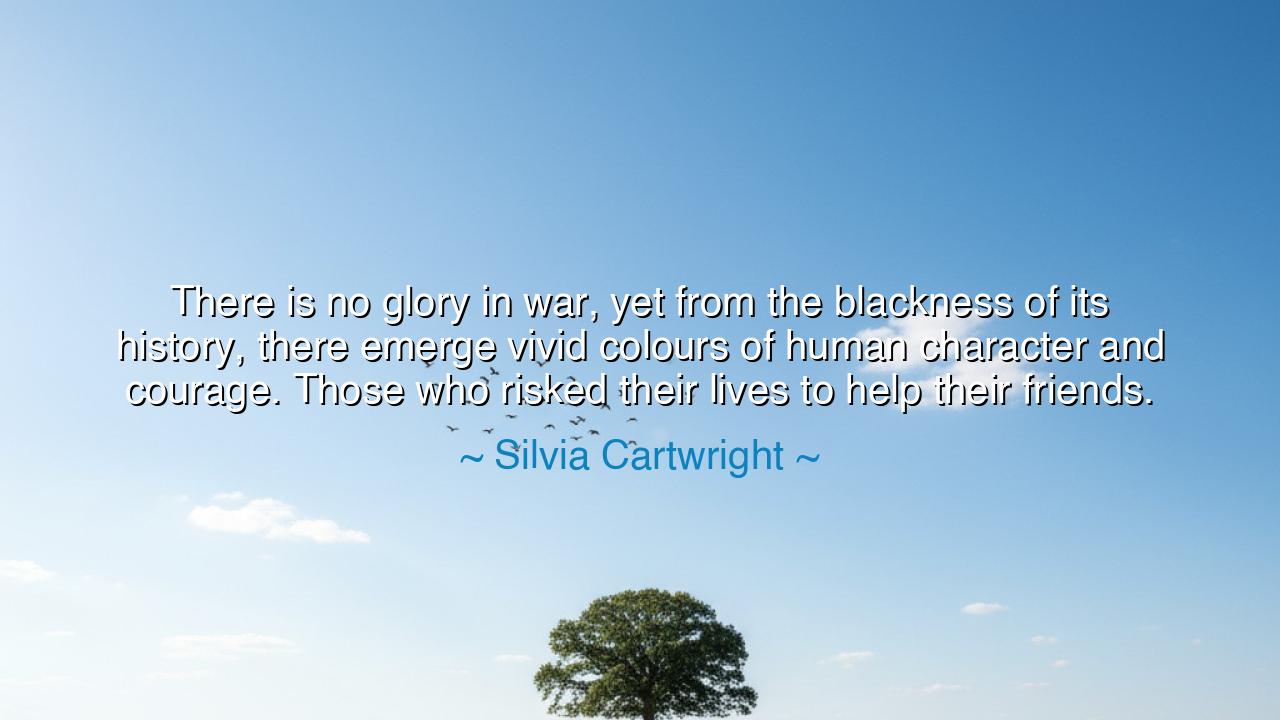
There is no glory in war, yet from the blackness of its history
There is no glory in war, yet from the blackness of its history, there emerge vivid colours of human character and courage. Those who risked their lives to help their friends.






The words of Silvia Cartwright — “There is no glory in war, yet from the blackness of its history, there emerge vivid colours of human character and courage. Those who risked their lives to help their friends.” — rise like a solemn bell over the graves of history. They speak of a truth known to all ages but often forgotten: that war, though draped in the banners of nations and the songs of victory, carries no glory within its core. It is, instead, the crucible of suffering — a place where the illusions of pride are burned away, and what remains, if anything noble endures, are the bare elements of human character and courage.
In these words, Cartwright — a judge, a humanitarian, and a seeker of justice — does not glorify conflict, but redeems from its ashes a deeper understanding of the human soul. For even in the blackest night of history, where hatred consumes and destruction reigns, there flickers a stubborn light: the compassion of one person for another. It is this light, born not of triumph but of mercy, that she calls the “vivid colours” — the hues of sacrifice, loyalty, and love that shine most brightly when all else is dark.
Throughout time, the poets and philosophers have wrestled with this paradox — that the worst of humanity can summon forth the best. The ancient Greeks knew it when they spoke of arete, virtue revealed in trial. They saw it in the warrior who, standing amid chaos, chose not to kill for glory but to protect his comrades. For in the furnace of war, where the trappings of civilization are stripped away, the true measure of the soul is laid bare. Not in conquest, but in compassion. Not in power, but in selflessness.
One story from the Great War speaks this truth more eloquently than any treatise. In the muddy trenches of France, where death hung heavy in the air, a soldier heard the cry of his wounded friend lying between the lines. The captain forbade rescue — “He’s gone already,” he said. But the soldier went anyway, climbing over the parapet into the storm of bullets. Hours later, he returned, dragging his friend’s lifeless body — and himself mortally wounded. “I told you he was dead,” said the captain bitterly. “You risked your life for nothing.” The dying man smiled faintly. “Not for nothing,” he whispered. “When I reached him, he said, ‘I knew you’d come.’” In that moment, glory was not in the battle, but in the bond between two souls — a love that defied fear, a loyalty that transcended death.
This is what Cartwright saw in her meditation on war — that amid the horror, humanity reveals its truest face. It is easy to be virtuous in peace, to be kind in comfort. But in the blackness of war, when life itself is the price of mercy, only those of courageous spirit can still choose love. The colours of character she speaks of — faith, compassion, and valor — are not painted in the ease of victory, but in the blood and tears of those who gave everything for one another.
Let this truth echo through time: there is no glory in war, no honor in destruction, no righteousness in hatred. Yet the human heart, indestructible in its capacity for love, can redeem even the darkest hour. From ruins, it builds again; from grief, it gives grace. And though nations may forget the battles, they will forever remember the ones who reached out a hand in the midst of chaos — those who risked their lives to help their friends.
The lesson, therefore, is this: seek not glory, but goodness. When conflict arises — whether on the battlefield, in your home, or within your own heart — choose compassion. Stand beside those who fall. Defend the weak, forgive the lost, lift the weary. For in these acts, you take part in the ancient heroism that no war can destroy — the quiet, enduring heroism of love.
So let Cartwright’s words be a light to your path. When darkness closes in, and the world seems consumed by division and despair, remember that from such blackness, the vivid colours of the soul can yet emerge. Be that colour. Be that courage. Be the one who runs into the storm — not for glory, but for love.






AAdministratorAdministrator
Welcome, honored guests. Please leave a comment, we will respond soon